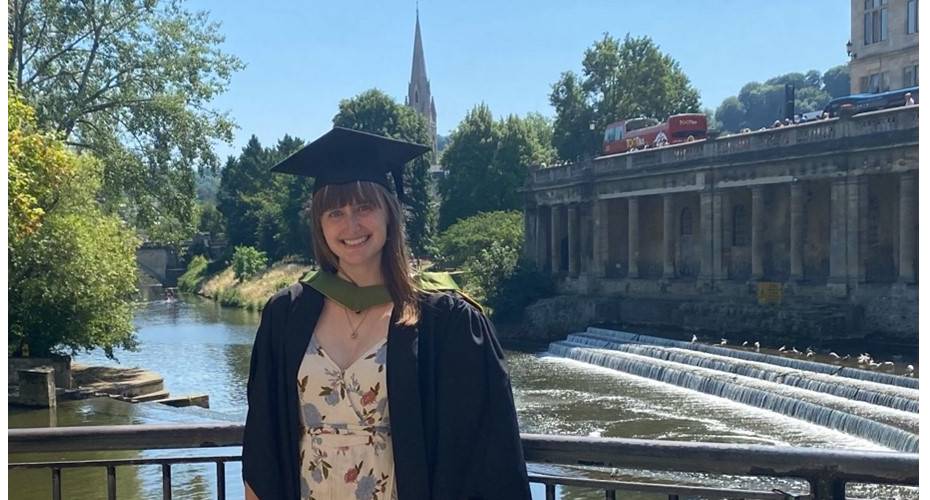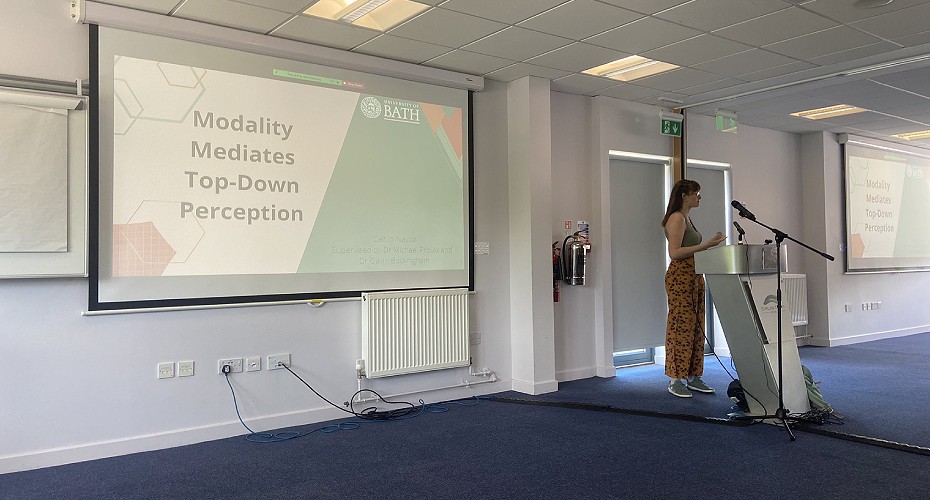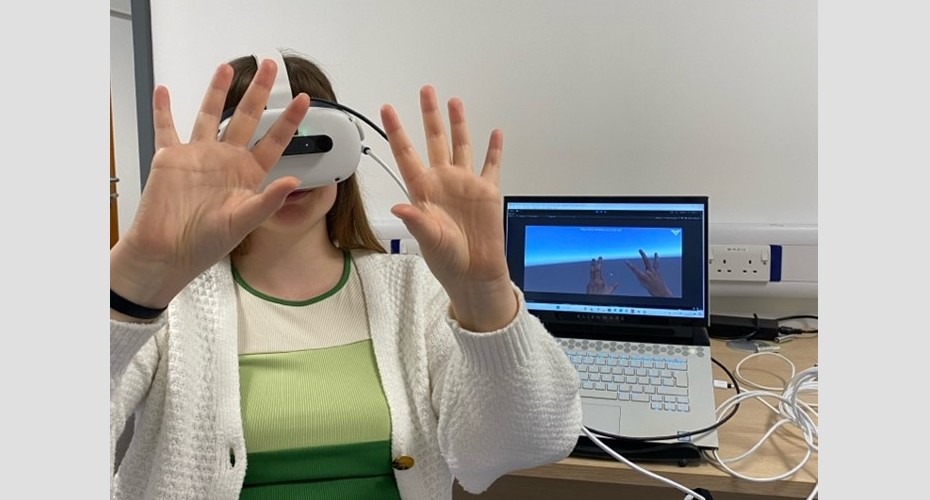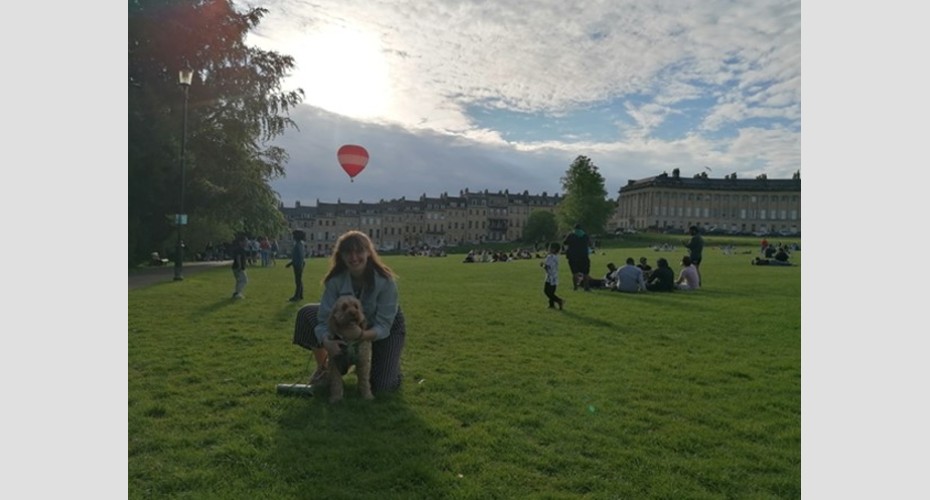Insight into the development of a Scientist: meet Caitlin Naylor!
Caitlin Naylor is a PhD student Cognitive Psychology and Applied Health Psychology at the University of Bath. Her work is focused on understanding how body perceptions can become distorted and includes using virtual reality under controlled laboratory conditions (you can read more about Caitlin’s fascinating work here from when she met science writer Beki Hooper: Caitlin Naylor | Research and Innovation | University of Exeter). Here Caitlin writes about her journey to becoming a scientist and shares some of the personal insights she gained along the way. Come and meet Caitlin in person at Soapbox Science Exeter on 22nd June 2024!
“You can be anything you want to be”. That’s what we might hear growing up, that’s how we tend to encourage children to dream and find joy in the world. But then something changes. I remember suddenly hearing, “You’re quite smart for a girl” or “Don’t worry, girls don’t tend to do well at science”, and the greatly appreciated “It’s not cool for girls to be clever”. And I found that I fully internalised these things as I grew up. I convinced myself I was terrible at science and let other people tell me what I was interested in.
And despite resisting it because I didn’t think it was what I was ‘supposed’ to enjoy, I found myself more and more drawn to scientific pursuits. I travelled 4 hours a day to go to a good college, I fought to change my A-Level (pre-university) subjects to focus on science, and with great people surrounding me, I was able to pursue my BSc in Psychology at the University of Bath, UK, an absolute dream come true. My love of academic research developed throughout my studies, and I am now beginning the final year of my PhD, hoping to have a career in academia.
If I could go back ten years and tell 15-year-old me that I was now a scientist, an academic, a researcher, and not only loving it but pretty good at it too, she would be shocked! Which, ultimately, is a sad fact. Because there was nothing about 15-year-old me, that meant I shouldn’t have believed it was possible. And whilst I have worked so hard to be where I am and earned my place, I found that at the start of my research career, I was still worried about what it would mean to be a woman and a scientist. But through scientific discovery came self-discovery, and I would like to share how I have carved my path as a woman, a scientist, and just me.
From needing to prove myself, to choosing to be proud of myself
For most of my life, my actions, my hard work, my interests, they have all been with the goal of proving myself to everyone else. In science, I have discovered what is meaningful to me, and I have allowed myself to be proud of the path I am on.
After a tough start to life, I decided early on to push myself to be the best I could be. I wanted to prove to the people in my life that I could make them proud. This drive carried me through school and motivated me to work hard, which I am proud of. But it created an awfully heavy load for myself to carry - for the longest time, my choices were guided by what I thought others wanted to see, which didn’t leave me with a strong sense of self. As I entered the world of academia, I found myself doubling that load with a whole new set of expectations – what it meant to be a woman in science. Despite encouragement and support from the immediate people around me, I couldn’t shake the misconceptions that “girls don’t tend to do well at science”, and much of the first year of my PhD was a fight to ‘prove’ that I belonged there, that I could produce valuable and innovative work, and that I was worth listening to. It was exhausting. But as that first year ended, I realised that after constantly working to prove myself to everyone else, I had no sense of when it would be ‘enough’. Each new achievement was ticked off as another way of showing I could ‘keep up’, but then it was on to the next way to prove my competence, never stopping to acknowledge that I’d already ‘proven’ myself time and time again. I realised that in working for the benefit of everyone else, I had no sense of what my work did for me.
I entered the second year of my PhD with a very different mindset. I recognised that with each new idea I had, I was contributing to our understanding of the human brain and behaviour, which was pretty cool. I was standing in front of a room full of people who wanted to hear my ideas and learn from my research, and I had been chosen to be there. I was designing experiments and answering new questions, discovering knowledge that wasn’t yet known to the rest of the world, and I realised what a privilege that was. As I slowed down and allowed myself to notice those things, to reflect on what they meant to me, to acknowledge what they showed about who I am, that’s when I finally began to feel like I belonged. By stopping to recognise my own success and to allow myself to feel proud, I also noticed that those around me where equally encouraging, and I just hadn’t ley myself believe in their words of pride before now, because I thought I was just ‘doing what I was supposed to’. But becoming a scientist has provided me with a community that understand the hard work and perseverance required and celebrate the moments we work towards. I realised that not only did I love all those moments that science gave me, but that I was starting to understand more about myself, the things that bring me joy in life. Through science, I started to feel like everything I did was worth being proud of.
From no clear role model, to creating my own role model
At the start of my academic journey, I felt rather lost, because science was never the path I had mapped out, I rather tripped and fell into it, and so I didn’t have a clear role model to provide that direction. However, I soon realised that I didn’t need any single person to provide my inspiration; instead, I could create my own.
There are many aspects of my situation and my identity that would make it hard to find a role model. I am the first person in my family to be a PhD candidate, pursue a career in academia, and have an interest in science. While my family are proud of me, this world is entirely foreign to them. I can’t chat about my research at the dinner table, turn to my parents for advice on a work problem, or get support navigating the process of job applications. I also have a long-term health condition, which requires some adjustments to the ‘standard’ way of working. I was really worried about being labelled as ‘difficult’ or ‘making a fuss’, as conversations about my needs to people who don’t have those same experiences can be difficult to navigate alone. The last thing that makes this world a little harder to find my place in - as much as I wish this didn’t matter in this day and age - is that I am a young woman. Don’t get me wrong; there are many strong, intelligent, research-leading women in my field, university, and department. But the expectations of those women, the standards they are held to, and the paths to success were much less clear to me when I first started. At times, it can feel like a constant struggle of wanting to be heard but doubting my contribution, wanting to show my strength but questioning if I would appear pushy, wanting to show my passion but worrying I was being too emotional. It was hard to realise that my biggest challenge of being a woman in science was overcoming the worries and fears I had about my place in this world. And when I began, I was worried that these different qualities would mean that I wouldn’t fit in, I was worried that I would be lonely in the scientific world.
In truth, I couldn’t have been more wrong - my scientific world has allowed me to build a network of people who, together, made the perfect role model. No single person would be able to provide all of the support, advice and inspiration that someone in my situation may benefit from – and that’s ok because a central part of science is community. I have found a friend to understand the struggle of being a first-generation scientist and the pride that comes with that. I have found a male mentor who insisted I prioritise my physical and mental health, making it clear that it was no compromise to my academic integrity, and ensuring I understood how much I was capable of, independent of my circumstances. I have found a female mentor who unapologetically prioritises her family whilst consistently demonstrating the outstanding research she can achieve – a woman, a mother, and a brilliant scientist. I have found the necessary escape from this world in my family and friends, who can remind me that there is more to me than my work. I have a partner who listens to my struggles, shouts to anyone who will listen about my achievements, and celebrates all that I am.
But perhaps more importantly, I have realised that by being brave and striving for the scientific career I unexpectedly found myself wanting, I can become the role model I need. I can talk to students interested in research but are the first in their families to choose that path. I can have difficult conversations about mental health in the workplace and be open about my needs. I can celebrate my achievements as a woman and break down misconceptions through much-needed initiatives like Soapbox Science. I can make sure that I become part of someone else’s network. But I can also look to myself for the inspiration I was searching for because, ultimately, I am the only person who can provide the exact example I was looking for. I owe it to myself to recognise my hard work, celebrate my research and be in awe of the path I have chosen for myself.
From changing myself to fit science, to changing science to fit me
A big part of what can make science feel inaccessible, especially to young women, is the preconceptions about what a scientist is. I saw the biggest shift in my career success and enjoyment when I overcame the idea of what I ‘should be’ to have a successful scientific career and instead chose to make science fit what I needed.
Learning is the biggest part of the process at the start of any career. In many ways, that’s great and offers necessary and valuable opportunities. But in the early career stage, it can be challenging to work out the difference between what you have to do and what is done because that’s how everyone has been taught. I was struggling, not with the work, but with trying to work in everyone’s way except my own. Comparing myself to the progress of others and how they managed their work left me with a lingering worry that I was getting it all wrong. There can be competitiveness in the working environment. Some people believe that the later you stay at work, the better you are. That those who choose to work from home were lazy. Those who left at 3 pm were not doing enough work. Coming into the world of science, already feeling like I have something to prove, and hearing these misconceptions – it wasn't easy to find my way.
But science is all about innovation. Science thrives on new ideas, testing limits, being bold, taking a chance on your creativity. I chose to stop breaking myself to stick to a working routine that I thought I ‘should’ have been doing but definitely was not working for me. Instead, I decided to look around me and see the independence that research offers. To see how all of the different people in my network have entirely different ways of working but are all successful in their own right. I decided to capitalise on the freedom that science offers and find my own way. The goal is to advance scientific knowledge, and as long as that is being done, I found the right people did not worry about how you got there. I know I work much better in the morning, so I started my days earlier and left earlier, proudly holding my head high as I strolled out of work with the 3 pm group. I know that being in the office can make it harder for me to focus and manage, so I switched to hybrid working, choosing my location based on my needs instead of worrying about others seeing me work. I know that I do not do my best work when I sit at a laptop for 8 hours. But I know that when I prioritise self-care activities throughout the day, I can sit down for 6 hours, be more productive, and get more done than I ever would have without breaks. I know that by taking the weekends off to do the other things in my life that are important to me, I can come in again on Monday excited for science. With all these adjustments, I saw a shift in my relationship with my work and myself. I recognised that excellence is a goal, but is not an expectation, and should be celebrated when achieved. I also recognised that sometimes, the resources we have in our environment and within ourselves mean I have to be ok with just doing an ‘ok’ job. Most importantly, I realised I would not apologise or feel shame for prioritising myself over my work – leading a happy life and taking care of my needs allows me to be my best self, and so be my best scientist self too.
From science being scary, to science being part of me
So, my journey to science was a complicated one. I didn’t have everything mapped out at the start; I didn’t always know I could reach the destination. Whilst a career in science has offered many twists and turns, and a few cliff edges, I genuinely believe that anyone excited by discovering the world around us, should take the journey. Be brave enough to let go of the preconceptions, the expectations, the ‘shoulds’ and the ‘proves’. Be courageous enough to trust your creativity, your mind, and yourself, and carve a path that works for you – put yourself at the centre of science.




